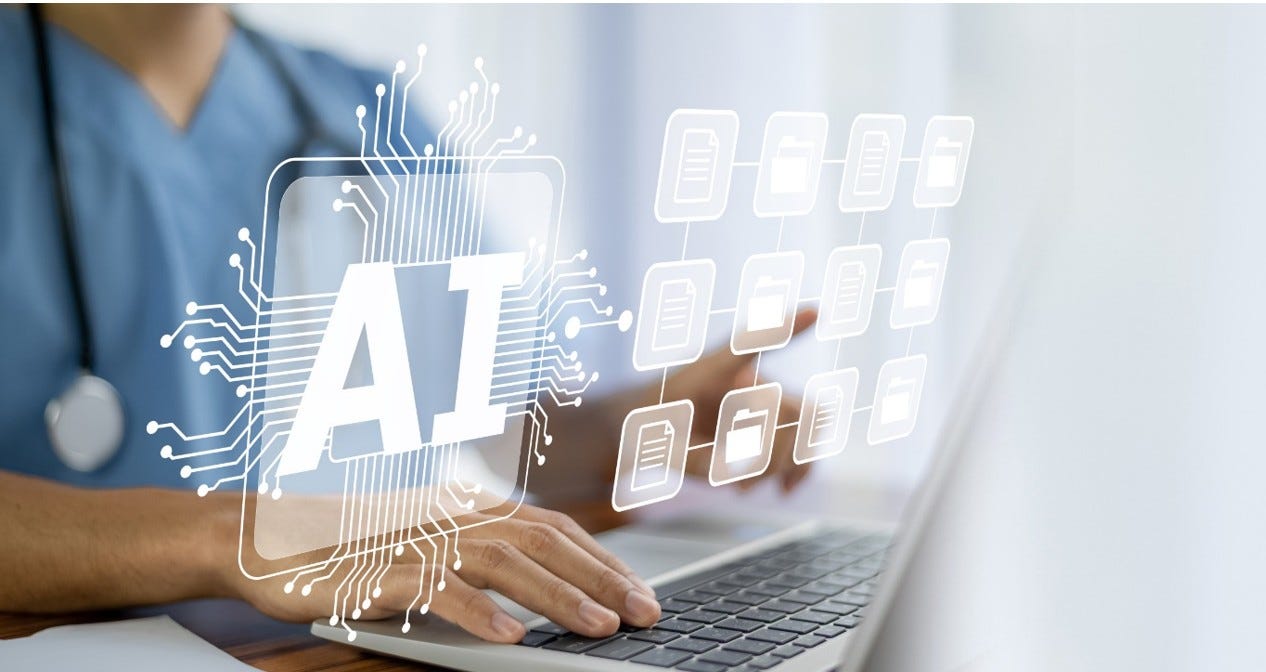When time and efficiency are critical (and when aren’t they?) it’s vital to reduce the pressures surrounding workflow choke points. Two pain points consistently holding businesses back are kissing cousins: repetitive manual processes, which can contribute to and slow decision-making. While these challenges are universal, they show up differently depending on the industry. Artificial Intelligence (AI) has solutions for tackling both problems head-on across industries with no obvious similarities.
Here's a quick look at how AI is transforming healthcare administration and manufacturing supply chains, two very different industries facing similar obstacles.
Repetitive Manual Processes in Healthcare: How AI Lightens the Load
A lawyer once told me that medical malpractice suits are not decided by the quality of the healthcare. Rather, they are determined by the quality of the paperwork.
Behind every doctor’s appointment, hospital stay, and insurance claim is an enormous web of record keeping. Countless hours are spent entering patient information, verifying insurance, processing billing codes, and chasing down compliance documentation. It’s tedious, repetitive work, and worse, it takes valuable time away from patient care.
Today’s AI-powered tools streamline manual processes. Intelligent document processing can extract data from handwritten forms, validate insurance details, and automatically populate electronic health records, all without human intervention. Some systems even use natural language processing to interpret doctor’s notes and generate billing codes in real time.
The impact is huge. Hospitals and clinics that implement AI automation have seen administrative processing times drop while reducing costly errors that can lead to billing rejections and compliance penalties. OntarioMD found that AI scribe technology allows doctors and nurse practitioners to spend 70% to 90% less time on paperwork, enabling more focus on patient care. Deloitte highlights a case where a healthcare provider achieved a 70% reduction in manual processing, increasing financial performance while reducing clinician burnout. There are many success stories to cite, with more coming almost daily.
In short, AI saves time and gives it back to the people who need it most.
Slow Decision-Making in Manufacturing: How AI Speeds Up Supply Chains
On the other end of the spectrum, manufacturing and supply chain managers face a different kind of drag, slow decision-making.
In the best of times, when rapidly changing production schedules, inventory levels, and customer demand, relying on outdated spreadsheets and gut feelings isn’t good enough. Every delay in adjusting orders, rerouting shipments, or forecasting demand can mean lost revenue, stockouts, or excess inventory sitting in a warehouse.
Companies that have integrated AI into their supply chain management have reported inventory reductions of up to 20%, and lead time improvements of 30–40%. That’s not just efficiency; that’s a serious competitive edge.
“[T]he biggest hurdle to smooth supply chain management is dealing with uncertainties…“ - Varsha writing in Techment, Oct. 5, 2022
With today’s sudden trade wars, shifting tariffs, port congestion, and supply chain disruptions injecting unpredictability into an already high-pressure, high-stakes environment, slow decision-making can be even more costly.
AI gives companies a critical edge by providing real-time visibility into supply chain risks, suggesting alternative suppliers or routes when disruptions occur, and helping leadership teams run cost simulations to anticipate the financial impact of new trade policies. AI changes the game by injecting speed and intelligence into the decision-making process.
For example, when tariffs on a key supplier’s goods spike overnight, AI systems can immediately identify more affordable sourcing options and reroute shipments through less congested ports. The result, as noted by Conversite , an AI and data analytics company, is that “while there is confusion, there is far less panic than one might expect.”

AI makes supply chains faster, smarter and more resilient. In a world change is constant and rapid, AI is the difference between swimming or sinking.
Healthcare and manufacturing couldn’t be more different, yet the core problems they face, too much manual work, not enough real-time decision-making, and a need for greater resilience, are remarkably similar. AI offers solutions that are as flexible as the industries themselves. It’s not only for tech giants anymore. It’s an essential tool for any organization ready to reclaim time, boost accuracy, and move at the speed of today’s business world.
There are more details in a white paper on the topic. Message me here to request a copy. When you’re ready, we’re available to meet one on one, just give us a shout.














Share this post